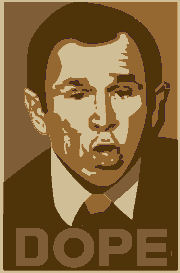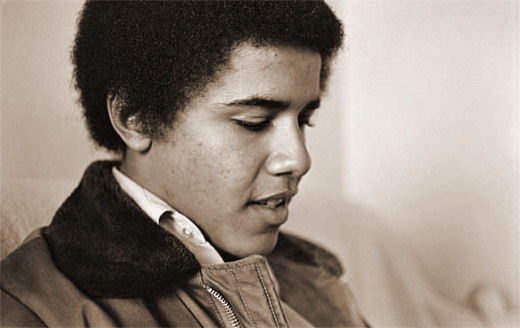Worldviews Collide
Obama or Cheney? It’s Your Choice. By Eugene Robinson
Washington Post
May 26, 2009
 Which reality do you inhabit, Obama World or Cheney World? If it’s the latter, remember that storm clouds are always gathering. Don’t forget your umbrella. In Obama World, it’s always morning. The sun is shining, the birds are chirping and the pollen count is low. In Cheney World, it’s perpetual twilight. Somewhere in the distance, a lone wolf howls at the rising moon.
Which reality do you inhabit, Obama World or Cheney World? If it’s the latter, remember that storm clouds are always gathering. Don’t forget your umbrella. In Obama World, it’s always morning. The sun is shining, the birds are chirping and the pollen count is low. In Cheney World, it’s perpetual twilight. Somewhere in the distance, a lone wolf howls at the rising moon.
In Obama World, human beings are flawed but essentially decent and rational. Most will behave in a way consistent with enlightened self-interest. In Cheney World, humanity’s defects are indelible and irredeemable. Absent evidence to the contrary, evil should be assumed to lurk in every heart. Better to do unto others before they have a chance to do unto you .
.
In Obama World, choices are artifacts of reasoning and thus are only as valid as the logic underlying them. Security and freedom, for example, do not have to be seen as an either-or proposition. The nation never came to a fork in the road with one path labeled "torture" and the other labeled "disaster." In Cheney World, choices are binary and absolute. There’s no wiggle room, no gray area, no time for second thoughts and no debate about how our options are framed. It’s my way or the highway, citizen.
In Obama World, objective fact matters. The failure to find any weapons of mass destruction in Iraq is significant. The absence of any link between  Iraq and the Sept. 11, 2001, terrorist attacks is relevant. In Cheney World, facts are based more on conviction than evidence. If it’s possible to imagine "nuclear-armed terrorists," as Cheney did in his speech the other day, then they "exist" at least as a concept – and this conceptual existence justifies torture, among other abuses…
Iraq and the Sept. 11, 2001, terrorist attacks is relevant. In Cheney World, facts are based more on conviction than evidence. If it’s possible to imagine "nuclear-armed terrorists," as Cheney did in his speech the other day, then they "exist" at least as a concept – and this conceptual existence justifies torture, among other abuses…
Obama World is an exciting place to live right now — not perfect, to be sure, but full of energy and hope. If Dick Cheney wants to stay in his bunker, that’s his business. Others might want to come up for some fresh air.

Cheney in the bunker on 9/11
From Dick Cheney’s point of view, he sees the dark reality of mankind and faces it squarely. To ignore it is naive and dangerous. In his vision, the only thing others really understand is superior power. Last week, he
said of his 911 experience:
With the plane still inbound, Secret Service agents came into my office and said we had to leave now. A few moments later, I found myself in a fortified White House command post somewhere down below. There in the bunker came the reports and the images that so many Americans remember from that day: word of the crash in Pennsylvania, the final phone calls from hijacked planes, the final horror for those who jumped to their death to escape being burned alive. In the years since, I’ve heard occasional speculation that I’m a different man after 9/11. I wouldn’t say that. But I’ll freely admit that watching a coordinated, devastating attack on our country from an underground bunker at the White House can affect how you view your responsibilities.
The only question in my mind is not about Cheney’s proposed path for us. It is, of course, absurd. The question is whether he suggests it as a chronically paranoid person, or whether this worldview started in that bunker. I suspect the answer is "yes" [both]. P.T.S.D., post-traumatic stress disorder, is a psychiatric diagnosis that refers to something quite specific, the persistence of certain things after a traumatic experience – including:
- trauma specific fears
- altered states of consciousness
- re-enactments or re-experiences of the trauma
- altered view of the self and the world
I know I’ve talked about this question here repeatedly [maybe I have post cheney stress disorder], but it still deserves our attention. Faced with an unexpected and overwhelming emotional situation, many people are effected by it for life. They become hypervigilant, looking for possible cataclysmic events. Since the only possibile solution to the previous trauma is that it never happened in the first place, their lives become dominated by trying to "prevent the past." The traumatic experience stays alive in the mind as specific fears, recurrent experiences that "keep it alive," and altered states of consciousness related to the event itself.
We know, in so far as we can know, that Cheney has this disorder – just reading the memos that he masterminded [below], or reviewing his NSA Surveillance Program, or thinking about his monomaniacal march to Iraq, tell us a lot. But listening to his speech is a chilling confirmation. We don’t know about numbers 2. and 3. above. He hasn’t told us. But 1. and 4. are solidly there. Unfortunately, people with P.T.S.D. often develop a "heart of darkness" [as I described below]. Ask the wives of some of our returning veterans. P.T.S.D. overrides many things – the statistical nature of things [if it might happen, it will happen], hope, empathy, connectedness, even reason.

After the First Gulf War, Cheney
said:
I think if Saddam wasn’t there that his successor probably wouldn’t be notably friendlier to the United States than he is. I also look at that part of the world as of vital interest to the United States for the next hundred years it’s going to be the world’s supply of oil. We’ve got a lot of friends in the region. We’re always going to have to be involved there. Maybe it’s part of our national character, you know we like to have these problems nice and neatly wrapped up, put a ribbon around it. You deploy a force, you win the war and the problem goes away and it doesn’t work that way in the Middle East it never has and isn’t likely to in my lifetime.
We are always going to have to be involved there and Saddam is just one more irritant but there’s a long list of irritants in that part of the world and for us to have done what would have been necessary to get rid of him–certainly a very large force for a long time into Iraq to run him to ground and then you’ve got to worry about what comes after. And you then have to accept the responsibility for what happens in Iraq, accept more responsibility for what happens in the region. It would have been an all US operation, I don’t think any of our allies would have been with us, maybe Britain, but nobody else. And you’re going to take a lot more American casualties if you’re gonna go muck around in Iraq for weeks on end trying to run Saddam Hussein to ground and capture Baghdad and so forth and I don’t think it would have been worth it. I think the, the decision the President made in effect to stop when we did was the right one.
Did he change his mind because of oil, or because his world-view changed after the trauma of 9/11? Probably another "yes" [both], I’m afraid.





 I think this kind of report is important for several reasons. First, it is an antidote to the monotonous and unfounded claims by the Vice President [note that there aren’t many people backing up his claims]. But more importantly, there are lots of people out there with specific information that can clarify all this murkiness — people who “know” if there was White House/Department of Defense pressure to use torture to extract reasons to Invade Iraq. We are inundated with “un-named” or anonymous sources right now. While it’s not the best term, it needs to become fashionable to tell the whole story. Interviews like this one pave the way to an increasing unburdening from people who know the real answers. One loud whistle, and we will have a symphony….
I think this kind of report is important for several reasons. First, it is an antidote to the monotonous and unfounded claims by the Vice President [note that there aren’t many people backing up his claims]. But more importantly, there are lots of people out there with specific information that can clarify all this murkiness — people who “know” if there was White House/Department of Defense pressure to use torture to extract reasons to Invade Iraq. We are inundated with “un-named” or anonymous sources right now. While it’s not the best term, it needs to become fashionable to tell the whole story. Interviews like this one pave the way to an increasing unburdening from people who know the real answers. One loud whistle, and we will have a symphony…. It’s not just about roads and bridges, although they are important. It’s also about schools, and the electrical grid, and environmental and technological innovation. It’s about establishing a world-class industrial and economic platform for a nation that is speeding toward second-class status on a range of important fronts. It’s about whether we’re serious about remaining a great nation. We don’t act like it. Here’s a staggering statistic: According to the Education Trust, the U.S. is the only industrialized country in which young people are less likely than their parents to graduate from high school…
It’s not just about roads and bridges, although they are important. It’s also about schools, and the electrical grid, and environmental and technological innovation. It’s about establishing a world-class industrial and economic platform for a nation that is speeding toward second-class status on a range of important fronts. It’s about whether we’re serious about remaining a great nation. We don’t act like it. Here’s a staggering statistic: According to the Education Trust, the U.S. is the only industrialized country in which young people are less likely than their parents to graduate from high school…
 Which reality do you inhabit, Obama World or Cheney World? If it’s the latter, remember that storm clouds are always gathering. Don’t forget your umbrella. In Obama World, it’s always morning. The sun is shining, the birds are chirping and the pollen count is low. In Cheney World, it’s perpetual twilight. Somewhere in the distance, a lone wolf howls at the rising moon.
Which reality do you inhabit, Obama World or Cheney World? If it’s the latter, remember that storm clouds are always gathering. Don’t forget your umbrella. In Obama World, it’s always morning. The sun is shining, the birds are chirping and the pollen count is low. In Cheney World, it’s perpetual twilight. Somewhere in the distance, a lone wolf howls at the rising moon.  .
.  Iraq and the Sept. 11, 2001, terrorist attacks is relevant. In Cheney World, facts are based more on conviction than evidence. If it’s possible to imagine "nuclear-armed terrorists," as Cheney did in his speech the other day, then they "exist" at least as a concept – and this conceptual existence justifies torture, among other abuses…
Iraq and the Sept. 11, 2001, terrorist attacks is relevant. In Cheney World, facts are based more on conviction than evidence. If it’s possible to imagine "nuclear-armed terrorists," as Cheney did in his speech the other day, then they "exist" at least as a concept – and this conceptual existence justifies torture, among other abuses…
